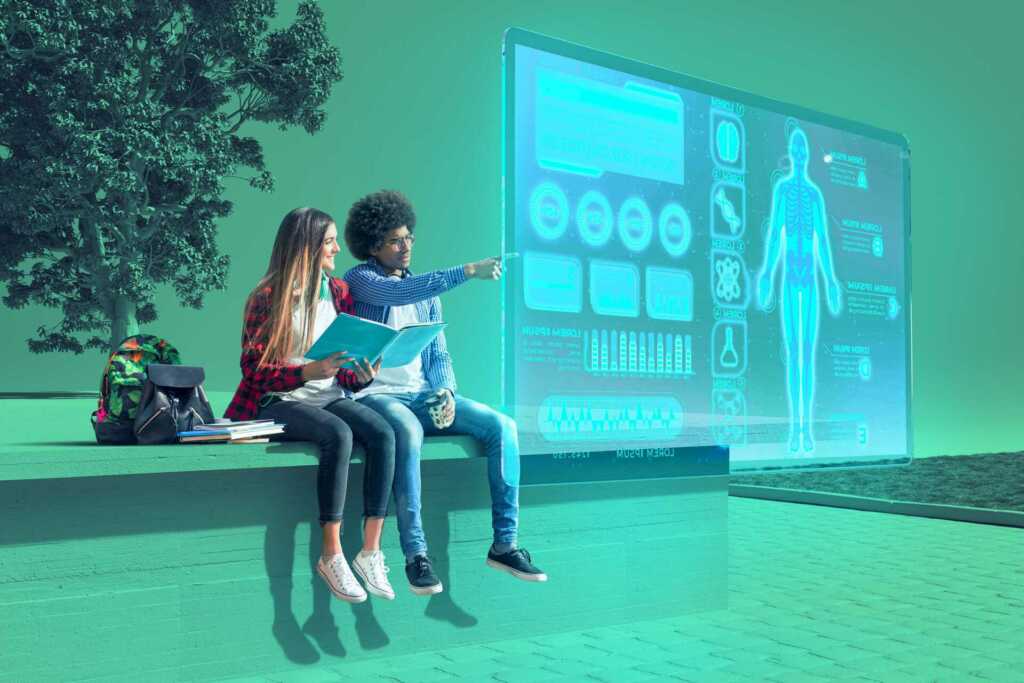
Revolutionizing Learning: The Fusion of AI and Big Data in US Universities
- Last Updated - 04/14/2024 - 11:54 AM
- Study in USA

In this digital age, the integration of education and technology has led to revolutions in thought, which are changing the nature of teaching and learning in US Universities. At the forefront of this change are the advancements in artificial intelligence (AI) and massive data. They are revolutionizing the way information is obtained, disseminated, and customized at American universities. Join us for a look at the revolutionary use that is AI as well as big data in higher education, allowing for new possibilities for efficiency, innovation, and student satisfaction.

Unleashing the power of AI Personalized Learning Experiences
AI is poised to transform education by providing individualized learning experiences that cater to the specific demands and preferences of individual students. With advanced algorithms and machine learning AI-powered systems analyze huge quantities of data to discover patterns of preferences, and learning styles, allowing educators to tailor their pace of instruction, curriculum, and delivery of content. For instance, whether through adaptable learning modules, intelligent tutoring systems, or virtual assistants AI allows students to develop at their own speed and provides instant feedback and assistance.
Data-Driven Insights to Enhance Student Achievement and Retention
The use of big data is changing the way that universities assess and aid student achievement. Through the use of the vast amount of data generated by students’ interactions, performance metrics, or engagement levels, schools can gain information about student behavior academic performance, their progress in school, and the risk factors that lead to attrition. With predictive analytics, schools can detect students who are at risk of falling behind or abandoning the program and provide specific interventions and support services to increase retention rates and outcomes at graduation.
Optimizing Operations by streamlining administrative processes
In addition to the academic setting, AI and big data improve the administrative processes and operations of universities. From enrollment and admissions management to financial aid processing, and alumni communications, these AI systems can automate routine tasks, decrease administrative burdens, and increase efficiency. Through the use of predictive models and data-driven decision-making universities can manage their resources more efficiently, improve the scheduling of courses, and improve the overall experience for students.
Promoting Research and Innovation by Speeding up the process of discovery
AI and Big Data have revolutionized research and innovation at U.S. universities, enabling researchers to solve complex problems and speed up discovery across a variety of disciplines. Data mining as well as natural language processing and machine learning methods allow researchers to analyse massive datasets, find patterns that are not obvious, and create new insights across fields ranging from engineering and healthcare to humanities and social sciences. AI-powered tools and platforms enable collaboration, experimentation, as well as knowledge sharing, resulting in advances and pushing the limits of human understanding.
Ethics: Managing the Challenges and Risks
Although the potential advantages of AI or big data within higher education can be immense they also pose crucial ethical issues and concerns. Universities need to address concerns related to security, privacy, and bias in algorithms so the AI systems are open accountable, fair, and just. Furthermore, concerns over the privacy of students’ intellectual property rights and the effects of automation on the workforce must be carefully considered and require ethical supervision.
Preparing Future Leaders for the Future: Training students to lead in the Digital Age
As universities adopt AI as well as big data as a way to improve their teaching, they play a crucial part in preparing students for the opportunities and challenges that come with the new digital age. Through integrating data literacy, the ability to think critically, as well as computational capabilities into the curriculum across disciplines, universities are empowering students with the knowledge and tools that they need to be successful in a world that is increasingly driven by data. Through opportunities for experiential learning such as internships, job opportunities, and other industry collaborations, universities are helping students to be ethical leaders innovators, and problem-solvers in a digital economy.
Conclusion: Leading Education for the Future of Education
We are at the crossroads of education and technology and education, the combination of AI and Big Data can have the potential to be a revolutionary force that will transform the higher education system across the United States. Through making use of the potential that comes from AI as well as big data schools can discover new avenues for individualized learning for students, achievement, and research innovation as well as efficiency for administration. Let’s harness the potential of AI and Big Data to lead learning’s future, help students, and build an equitable, more inclusive, and sustainable society for the generations to follow.
You might like these..
Randomly chosen articles that you might like.

Cultivating Change: The Vital Role of Universities in Promoting Sustainability and Environmental Consciousness
Universities play an integral role in shaping the beliefs behavior, values, and behaviors of the next generation. In an age of

Best Data Science Course Online in India 2024
Introduction: Data is now the currency of innovation and progress in the age of digitization. A record of every transaction, click,

The Pinnacle of Education: Why USA Universities Stand Out Globally!
In the vast landscape of higher education, USA universities emerge as beacons of excellence, attracting students from every corner of

Choosing the Best University in USA: A Guide to Select the Top USA Universities.
Choosing the best University in USA is a crucial choice that will have a big impact on your educational journey

How to Apply to Any University in USA, Super easy, very simple, and effective.
You can successfully navigate the application process to University in USA with a little planning and attention. Here is a guide

Anyone from India can apply to USA Universities. Yah! It’s easy.
Yes, individuals from India can certainly apply to USA Universities. The application process for U.S. universities can be competitive and

USA Universities are great in terms of Sports as well as education. Yes, You heard it right!
The perception that USA Universities are great in terms of education and sports is shaped by several factors. Here are

Best Universities in USA, You can apply. Yes, it’s correct.
Determining the Best Universities in USA can depend on various factors such as academic programs, faculty expertise, resources, location, and

USA Universities are not good, Is this correct? discuss.
USA Universities are home to many prestigious universities and research institutions that are globally recognized for their academic excellence and

How to apply at Top Universities 2023, follow these steps.
Applying to Top Universities 2023 in USA typically involves several steps. Here’s a general guide to help you through the

You should not do this If you get a chance to USA university. Try them now!
Starting university in a new country, especially the United States, can be an exciting but challenging experience. Here are some

Most Common Mistakes while searching for a new University in the USA, Stay Safe.
While searching for University in the USA, students may make common mistakes that can impact their decision-making process and overall

Why does everyone blindly trust Universities in USA?
While it may not be accurate to say that everyone blindly trusts Universities in USA, there are several reasons why

USA Universities are not good! Says the expert, is that correct?
Certainly! Here’s a more detailed exploration, broken down into Reality of USA Universities, to provide a comprehensive understanding of the

Why and how USA universities become so Popular? Something wrong here.
The popularity of USA Universities can be explained in simple terms through a variety of factors. Let’s break it down:

New Academic Updated! USA Universities are not evolving?
USA Universities are constantly innovating and developing new academic programs to meet the evolving needs of students and the demands




